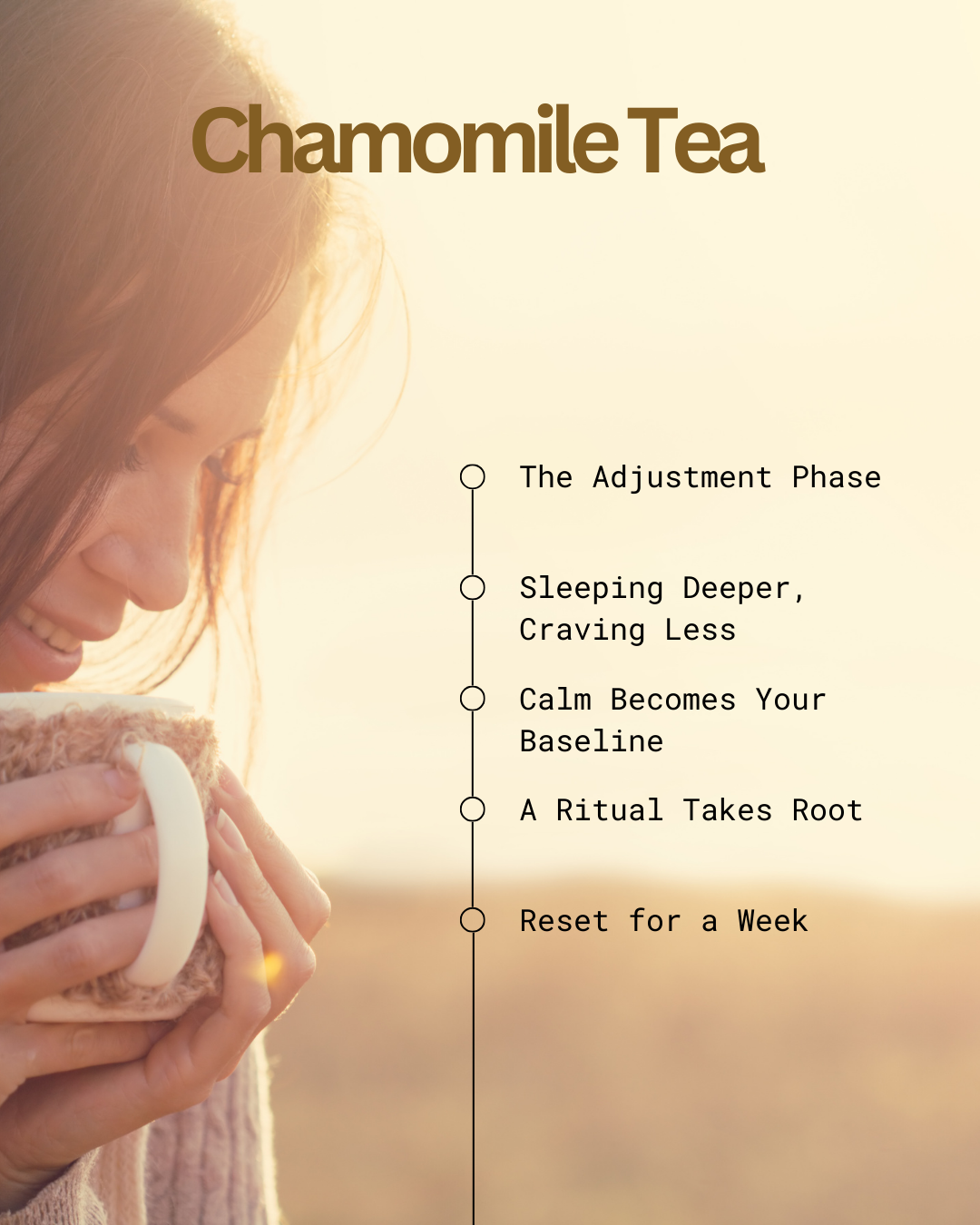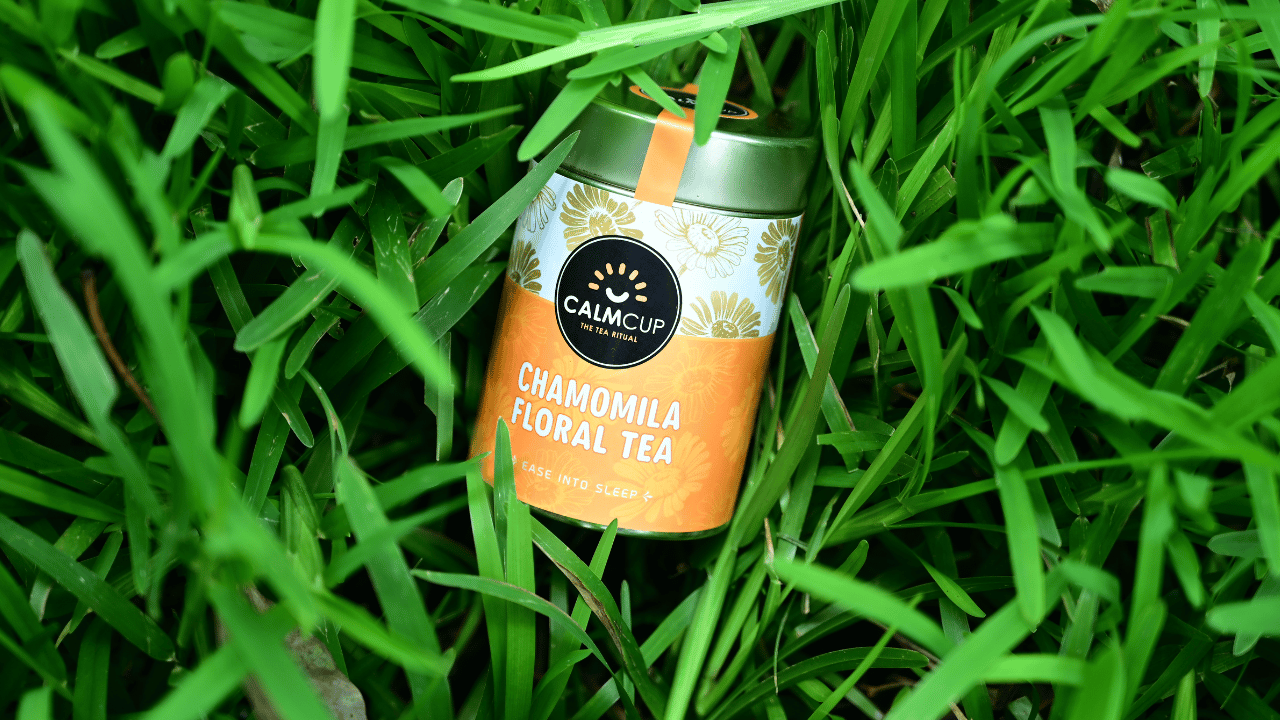Introduction:
It starts with a simple swap.You replace your late-night scroll or sugary dessert with a cup of chamomile tea. Not because you’re trying to overhaul your life—but because you’re craving calm.
And that’s where the shift begins.
Chamomile tea isn’t a quick fix. It’s a quiet ritual. But when sipped daily, it gently rewires how your body responds to rest, digestion, stress—even cravings. Let’s take a closer look at what really happens when you make this calming herbal infusion a daily habit.

Week 1: The Adjustment Phase
In the first few days, your body tunes into something new.
Hydration goes up — especially if you were reaching for wine, coffee, or soda at night before.
You may feel a mild sleepiness after your evening cup. That’s apigenin—chamomile’s calming compound—gently nudging your nervous system to slow down.
Some experience a light “detox” effect: a few extra bathroom visits, subtle digestive shifts. Nothing dramatic, just your system clearing out with better hydration and fewer stimulants.
📌Use filtered water and loosely dried chamomile flowers for a more potent brew during this phase.
Week 2: Sleeping Deeper, Craving Less
By the second week, you’ll notice:
Deeper sleep cycles — you’re not just falling asleep faster, but staying asleep longer. No more tossing at 2 AM.
Fewer late-night cravings — as cortisol stabilizes, the 10 PM urge to snack fades.
Skin begins to shift — not overnight, but with better digestion and lower inflammation, a healthy glow starts to emerge.
📌 You may feel more hydrated in the mornings, since chamomile is caffeine-free and doesn't disturb overnight water retention.
Week 3: Calm Becomes Your Baseline
Now something subtle, yet powerful, kicks in.
You’re less reactive. Traffic? Delays? You’re breathing through it. The nervous system is slowly recalibrating to calm.
Bloating is rare — thanks to chamomile’s gentle antispasmodic properties. It helps relax intestinal muscles and reduce trapped gas.
Mornings feel clearer. Your sleep is uninterrupted, digestion’s regular, and your mind is no longer foggy by 10 AM.
📌 You’re not replacing coffee—you’re balancing your system so it doesn’t depend on it.
Week 4 and Beyond: A Ritual Takes Root
Here’s where the magic of consistency reveals itself:
You begin to look forward to your tea not just for taste, but for how it signals your body to wind down.
Fewer colds, less fatigue — your immunity may feel stronger. Chamomile’s antioxidants (like apigenin, quercetin, and luteolin) help your body fight off minor infections.
Most powerfully: you associate this cup with rest. It becomes a cue for stillness in a day full of noise.
📌 A daily ritual, even as small as tea, helps you feel emotionally regulated.
What Happens Long-Term
When chamomile tea becomes a daily companion, here’s what settles in:
| Benefit | What It Feels Like |
| Regulated Sleep | Fall asleep easier, wake up less often |
| Balanced Mood | Less anxiety, improved emotional resilience |
| Better Digestion | Less bloating, regular bowel movements |
| Improved Skin | Fewer breakouts, more hydration |
| Enhanced Immunity | Fewer colds, faster recovery |
| Mindful Evenings | More intentional winding down time |
It doesn’t “fix” life. But it supports your body in doing what it’s naturally meant to do: restore, digest, breathe, and heal.
How to Maximise Your 7-Day Reset
Consistency is key – Same time, every night.
Pair with low-stimulation activities (journaling, gentle yoga, dim lighting).
Avoid caffeine or sugar in the evening.
Sip slowly, focusing on your breath.
Why Chamomile Tea Deserves a Spot in Your Nighttime Ritual
Chamomile tea has been the quiet hero of nighttime wellness rituals, loved for its ability to gently guide the body into a state of calm. Brewed from the dried flower heads of Matricaria chamomilla (German chamomile) or Chamaemelum nobile (Roman chamomile), this caffeine-free herbal infusion is naturally rich in antioxidants like apigenin—a plant compound known to promote relaxation and improve sleep quality.
Its soft, apple-like aroma and delicate floral taste make it not only a treat for the senses but also a scientifically backed way to reduce stress, soothe digestion, and signal to your body that it’s time to unwind. No wonder it’s been a trusted bedtime companion from ancient Egypt to modern-day homes.
FAQs
1. Can I drink chamomile tea in the morning? Yes, chamomile tea can be enjoyed at any time of day. In the morning, it offers a gentle, caffeine-free start that won’t cause jitters. However, most people prefer it in the evening for its calming effects.
2. Does chamomile tea make you sleepy instantly? Not instantly. Chamomile’s calming compound, apigenin, works subtly by binding to brain receptors that promote relaxation. Most people feel drowsy within 30–45 minutes after drinking it, especially in a quiet, low-light setting.
3. How much chamomile tea should I drink daily? For most adults, 1–2 cups per day is safe and effective. Drinking more won’t necessarily increase the benefits, and it’s best to be consistent over time.
4. Does chamomile tea help with anxiety? Yes, research suggests chamomile may reduce mild to moderate anxiety symptoms by supporting relaxation and lowering cortisol levels. While it’s not a replacement for medical treatment, it can be a supportive daily ritual.
Conclusion
When you drink chamomile tea daily, your body remembers what calm feels like. Not as a luxury—but as a habit. Over time, it becomes more than a tea—it becomes a signal. A soft exhale after a long day.
So here’s to one cup a day.One pause.One ritual that roots you.

